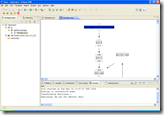 I just returned from a trip to Germany and to AOSD 2008 in Brussels. It was truly a great conference. The research talks were almost all really interesting, I did some great networking and the social program was absolutely outstanding (I just say chocolate tasting and beer tasting!). Some of the talks that I enjoyed most were Aspect Oriented Test Case Instantiation by Benz and the keynotes by Daniel Wiese and Philip Wadler (Mr. “Super-Lambda”). Unfortunately I missed the third keynote because of the social events in the night before 😉
I just returned from a trip to Germany and to AOSD 2008 in Brussels. It was truly a great conference. The research talks were almost all really interesting, I did some great networking and the social program was absolutely outstanding (I just say chocolate tasting and beer tasting!). Some of the talks that I enjoyed most were Aspect Oriented Test Case Instantiation by Benz and the keynotes by Daniel Wiese and Philip Wadler (Mr. “Super-Lambda”). Unfortunately I missed the third keynote because of the social events in the night before 😉
 I stayed a few days longer to visit the Programming Technology Lab at VUB, specifically Charlotte Herzeel and Pascal Costanza. Thanks for having me and thanks for all the interesting discussions!
I stayed a few days longer to visit the Programming Technology Lab at VUB, specifically Charlotte Herzeel and Pascal Costanza. Thanks for having me and thanks for all the interesting discussions!
I uploaded some photos to my gallery. In the next days I will be adding photos from our RWTH Alumni meeting which I am currently attending in Atlanta.












